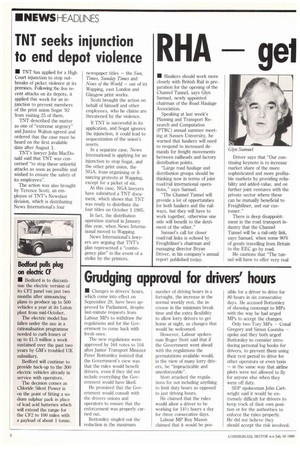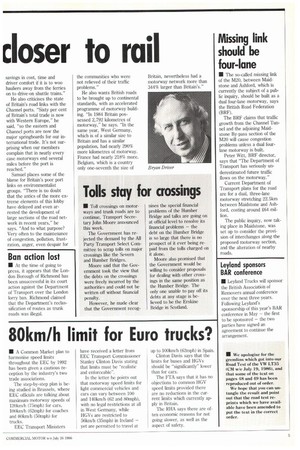RHA gel
Page 6

Page 7

If you've noticed an error in this article please click here to report it so we can fix it.
closer to rail
• Hauliers should work more closely with British Rail in preparation for the opening of the Channel Tunnel, says Glyn Samuel, newly appointed chairman of the Road Haulage Association.
Speaking at last week's Planning and Transport Research and Computation (PTRC) annual summer meeting at Sussex University, he warned that hauliers will need to respond to increased demands for freight movements between railheads and factory distribution points.
"Large road haulage and distribution groups should be thinking now in terms of joint road/rail international operations," says Samuel.
"The Channel Tunnel will provide a lot of opportunities for both hauliers and the railways, but they will have to work together, otherwise one side will benefit to the detriment of the other."
Samuel's call for closer road/rail links is echoed by Freightliner's chairman and managing director Bryan Driver, in his company's annual report published today. Driver says that "Our continuing keynote is to increase market share of the more sophisticated and more profitable markets by providing reliability and added-value, and on further joint ventures with the private sector where these can be mutually beneficial to Freightliner, and our customer."
There is deep disappointment in the road transport industry that the Channel Tunnel will be a rail-only link, says Samuel, when some 90% of goods travelling from Britain to the EEC go by road.
He cautions that "The tunnel will have to offer very real savings in cost, time and driver comfort if it is to woo hauliers away from the ferries on to drive-on shuttle trains."
He also criticises the state of Britain's road links with the Channel ports. "Sixty per cent of Britain's total trade is now with Western Europe," he said, "so the eastern and Channel ports are now the major springboards for our international trade. It's not surprising when our members complain that in nearly every case motorways end several miles before the port is reached."
Samuel places some of the blame for Britain's poor port links on environmentalist groups. "There is no doubt that the antics of the more extreme elements of this lobby have delayed and even arrested the development of large sections of the road network in recent years," he says. "And to what purpose? Very often to the maintenance of congestion, pollution, frustration, anger, even despair for the communities who were not relieved of their traffic problems."
He also wants British roads to be brought up to continental standards, with an accelerated programme of motorway building. "In 1984 Britain possessed 2,792 kilometres of motorway," he says. "In the same year West Germany, which is of a similar size to Britain and has a similar population, had nearly 290% more kilometres of motorway. France had nearly 218% more. Belgium, which is a country only one-seventh the size of




















































































































